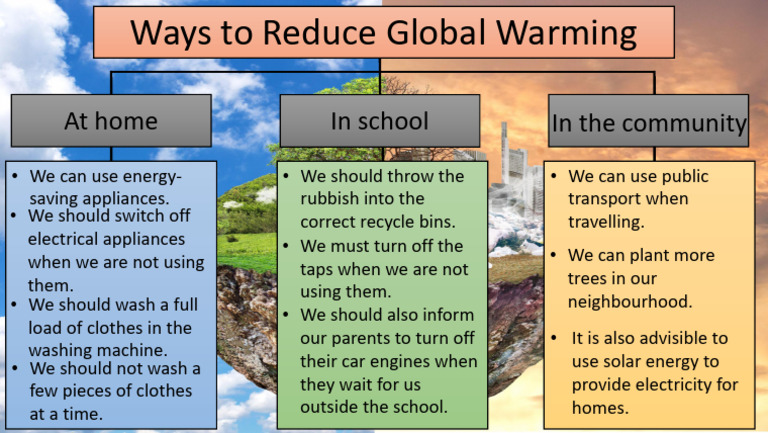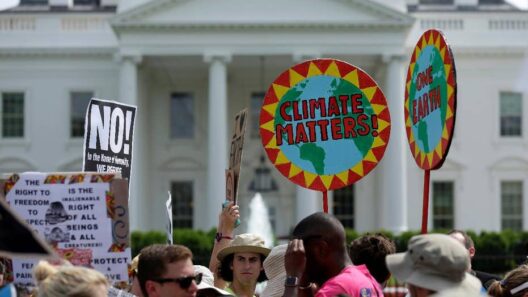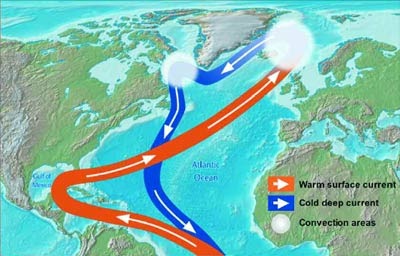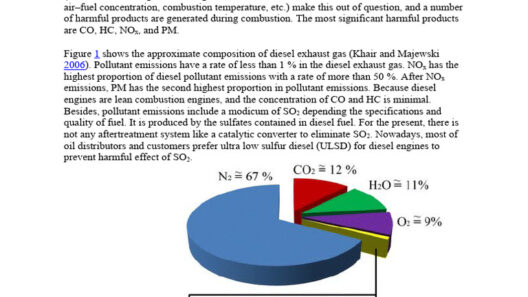Global warming is an urgent and multifaceted challenge facing humanity. It is the inexorable rise in Earth’s average surface temperature due to the increase in greenhouse gases (GHGs) in the atmosphere. The principal culprits—carbon dioxide, methane, and nitrous oxide—are primarily the byproducts of human activities. Hence, the onus falls upon each individual to contribute to curtailing this perilous phenomenon. Below are several actionable steps, each backed by rigorous research, that not only foster personal responsibility but also galvanize collective action in the fight against climate change.
First and foremost, energy conservation should be a paramount consideration. Residential energy consumption is a significant contributor to greenhouse gas emissions. Simple measures can greatly reduce usage. Illicit energy wastage occurs from leaving lights on in unoccupied rooms or failing to unplug devices when not in use. Opting for energy-efficient appliances—certified by ENERGY STAR or similar programs—can significantly decrease electricity consumption. Additionally, installing LED bulbs instead of incandescent ones can cut lighting-related GHG emissions by over 80%.
Transportation is another pivotal sector where personal choices can lead to substantial environmental benefits. The automobile is an emblem of modern convenience, but cars are a major source of carbon emissions. Commuting sustainably—instead of driving solo—can yield substantial reductions in personal carbon footprints. Carpooling, utilizing public transportation, biking, or even walking for shorter trips can drastically diminish reliance on fossil fuels. As an enticing alternative, electric vehicles (EVs) are becoming increasingly accessible. Transitioning to EVs not only reduces emissions but also encourages the development of renewable energy sources if charged from sustainable grids.
Equally important is food consumption, which directly links to environmental sustainability. The food system accounts for about one-third of global GHG emissions. Adopting a plant-based diet, even partially, can lead to considerable reductions in these emissions. Meat and dairy production require significant energy, land, and water resources, from cultivation to processing. By prioritizing local and seasonal produce, individuals can further minimize their carbon trail. Supporting sustainable agricultural practices—such as organic farming—also fosters soil health and biodiversity, ensuring a symbiotic relationship with the planet.
Water conservation, though sometimes overlooked, is instrumental in combating global warming. Freshwater resources are dwindling due to overconsumption and pollution. Simple steps, like fixing leaky faucets, taking shorter showers, and using water-efficient fixtures, can mitigate waste. Additionally, xeriscaping—designing landscapes to reduce or eliminate the need for irrigation—can lead to significant water savings while fostering local ecosystems.
Waste management is intrinsic to any strategy aimed at reducing global warming. It involves rigorous practices like recycling and composting to decrease landfill contributions. Landfills are not only unsightly environmental setbacks; they also emit methane, a potent greenhouse gas. Adopting the practice of ‘the three Rs’—Reduce, Reuse, Recycle—fosters a culture of sustainability. Individuals can mitigate their waste footprint by choosing products with minimal packaging or participating in local recycling programs. Additionally, composting organic waste returns crucial nutrients to the soil, creating a closed-loop system that nurtures the earth.
Furthermore, advocating for systemic change is an avenue that individuals should not overlook. While personal action is vital, collective efforts can magnify impact. Engaging in community initiatives, joining environmental advocacy groups, or attending municipal meetings on climate policies can provide the impetus for change at larger scales. Vote for local and national policies that prioritize environmental health and support initiatives that incentivize renewable energy use. Grassroots movements have historically catalyzed significant policy shifts, underscoring the power of civic engagement.
Education also plays a crucial role in environmental stewardship. Spreading awareness about climate change encourages informed decision-making within communities. Host workshops, share resources online, or engage in meaningful discussions with friends and family about climate issues. Extraordinary changes often germinate from informed, passionate individuals who are driven to enact positive change. Knowledge dissemination serves as a catalyst—empowering more individuals to join the cause and fostering a society that values environmental responsibility.
Lastly, it is paramount to understand the environmental ramifications of consumer habits. The market is rife with products that claim to be eco-friendly, but scrutinizing these claims is essential. Opting for sustainably packaged and produced goods not only fosters ethical consumption but also holds companies accountable for their environmental footprints. Be a discerning consumer, and understand that choices made at retail can reverberate through supply chains, influencing business practices that better align with climate goals.
In sum, preventing global warming requires a confluence of individual actions and systemic changes. From energy conservation, sustainable transportation, and mindful consumption, to community engagement and consumer awareness, every action counts. Collectively, these simple yet impactful measures can engender a more sustainable society. In a world increasingly aware of its fragile climate, the onus to act lies with everyone. Each choice can contribute meaningfully to a healthier planet, championing future generations in their quest for a sustainable existence.








